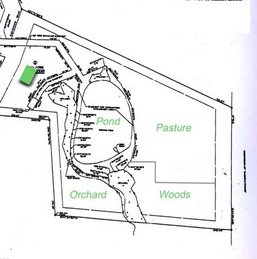We live on what is currently the edge of suburban sprawl: just a couple miles north or west lies farmland, and lots of it. So why do we buy so much of our food from the local supermarket, where produce is sourced from all over the world? Sure, this guarantees that just about anything we want to eat is available year-round. But this comes at a cost represented by transportation, fuel consumption, and greenhouse gas emissions.
That's why, last Saturday, we went for a little drive, turning left at a sign that read, "Grass-fed Jersey Milk 1.5 miles." The road grew narrower, and the grass and cows more plentiful. We pulled into the driveway of an Amish dairy farm we'd found through Local Harvest. A young girl was sweeping the driveway, and a boy was dribbling a soccer ball. Their mother came out of the house to greet us. Trying not to look too much like city folk, we asked for milk and eggs. She escorted us into an immaculate room with a large tank, dipped a pitcher into the tank, and poured its fresh, creamy contents into a half-gallon glass bottle. We learned that most of their milk is sold to consumers like us, some is used to make yogurt and cheese (also for sale), and a truck collects unsold milk weekly for packaging and distribution elsewhere. The family's goal is to be a 100% local consumer business within the year. The milk was delicious, and the eggs made beautiful golden omelets. I'll be back this weekend, this time for a full gallon of milk, and more eggs.
Even closer to home is Briar Hollow Farms, another Amish homestead with its own produce market. Their selection is highly variable, but by July you can count on Briar Hollow for the best-tasting corn in Chester County. Local Harvest has details of other nearby farm markets, most of which open in May. I'm going to use these markets to supplement our own home-grown produce, and reduce supermarket purchases by planning our meals around what's fresh and available locally.
Ideas like these have been germinating in my mind for a while, and crystallized when I read Barbara Kingsolver's book Animal, Vegetable, Miracle (read my review). Kingsolver is a convincing advocate of local eating, and the internet is chock-full of resources on the subject. We are not going "cold turkey" as some have done, but we will learn by doing. And I expect we will enjoy the process!
Tigertail Beach
15 hours ago





1 comment:
Brava, Laura and family! Wonderful to see you so inspired. I think eating local food is becoming an important piece of a healthy planet (and our healthy bodies!) We love our farmers' markets here in Portland and go almost every weekend during the season.
I look forward to hearing about your discoveries!
Post a Comment